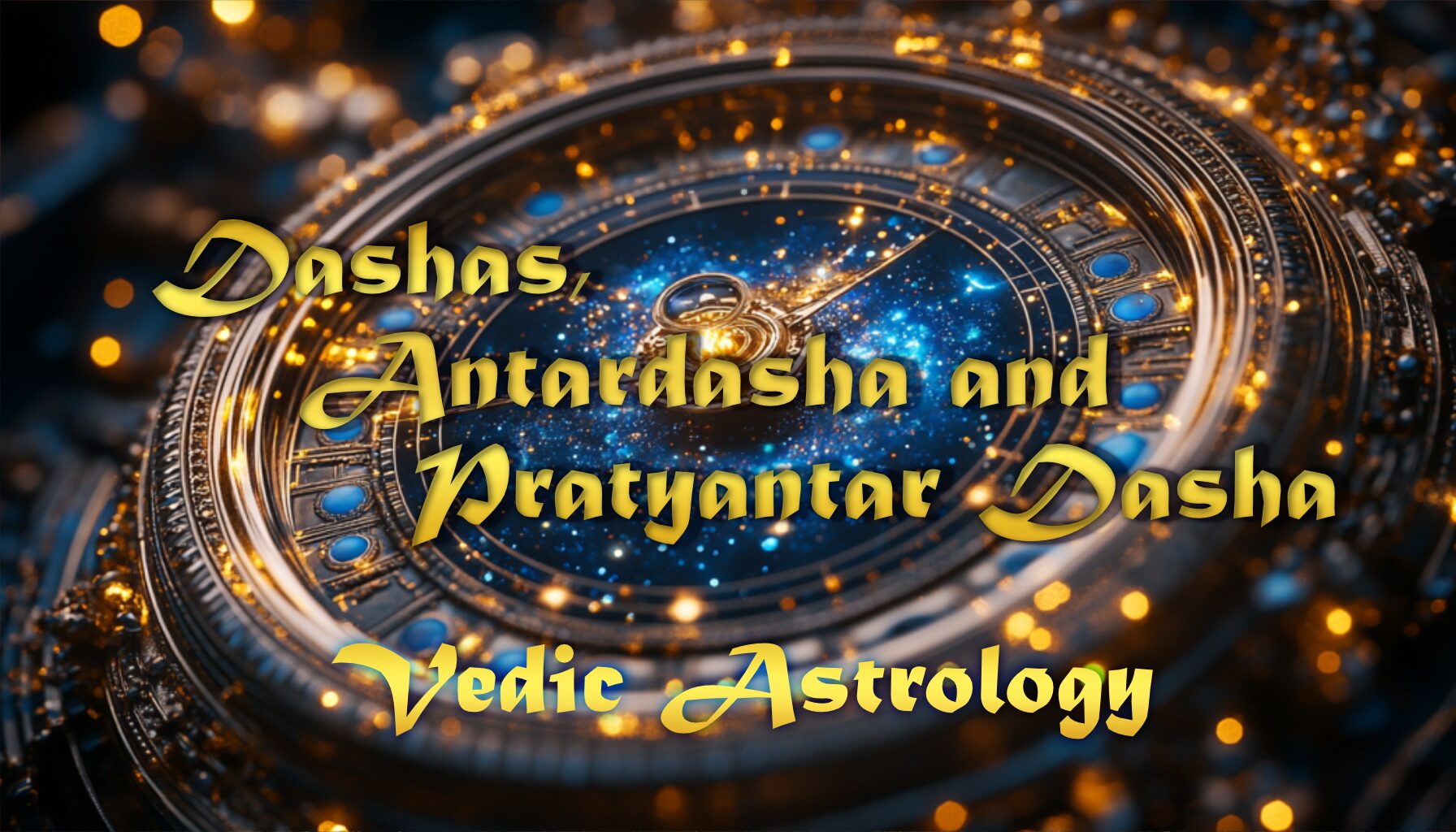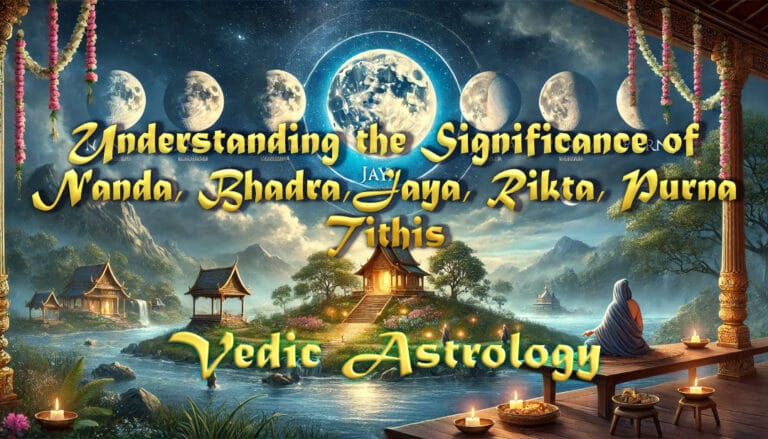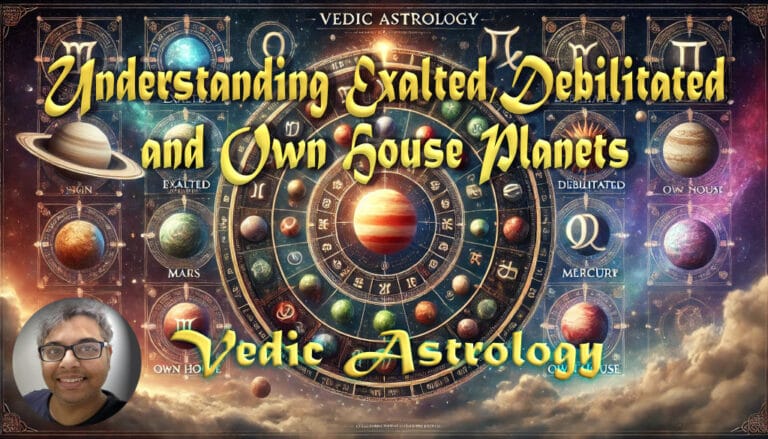Navigating Life’s Cosmic Clock Through Dashas
Predicting through Dashas, Antardasha and Pratyantar Dasha
Introduction
Vedic astrology offers profound insights into our life’s trajectory through the study of cosmic patterns. Among its most fascinating concepts are the Dashas, which are unique time periods that indicate various phases in an individual’s life. These aren’t merely abstract concepts; they represent distinct phases marked by specific planetary influences, both good and bad. This blog post explores how Mahadasha, Antardasha, and Pratyantar Dasha guide these cosmic influences, helping astrology enthusiasts and learners predict significant life events.
The Importance of Dashas
Understanding Dashas is crucial for anyone looking to comprehend Vedic astrology’s depth. Dashas are like the clockwork of the universe, dictating the ebb and flow of energies that impact our lives. Mahadasha, Antardasha, and Pratyantar Dasha are the three levels of Dashas that can forecast both auspicious and challenging events in one’s life. By understanding these, you can better prepare for the future.
The Impact of Dashas
The influence of dashas on a person’s life can be profound, affecting everything from career and relationships to health and spiritual development. Each dasha is ruled by a specific planet, and the characteristics of that planet become particularly prominent during its period. For example, a Mahadasha of Jupiter may usher in growth, wisdom, and prosperity, often enhancing opportunities for learning and expansion. On the other hand, a Saturn Mahadasha might bring challenges but also encourages discipline and resilience. The layered effects of Antardasha within a Mahadasha add complexity, as these shorter sub-periods can modify or intensify the main period’s effects. By navigating through these cosmic influences with foresight, individuals can harness the potential energies for personal development and mitigate negative impacts, ultimately leading to a more harmonious life journey.
Understanding Mahadasha, Antardasha, and Pratyantar Dasha
Mahadasha: The Major Period
The Mahadasha signifies a major period in one’s life, representing a long-term planetary influence that can last up to 20 years depending on the planet involved. This overarching influence plays a significant role in shaping life’s broader themes. The planet governing your Mahadasha will infuse its energy throughout this period, influencing everything from personal growth to life’s hurdles.
Mahadasha: Exploring Its Profound Influence
The Mahadasha is a pivotal component in Vedic astrology, serving as the key to unlocking a deeper understanding of one’s life events and patterns. Typically, each Mahadasha period can span from 6 to 20 years, dependent on the ruling planet, which cycles through the various phases of life. The inception of a Mahadasha is determined by the Moon’s Nakshatra, or lunar mansion, at the time of birth, thereby initiating a sequence of planetary periods that define the cosmic clock of one’s life.
Each planet exerts its unique influence during its Mahadasha, amplifying its inherent qualities and attributes. For example, during the Sun Mahadasha, individuals might experience enhanced confidence, authority, and opportunities for leadership. This period often brings a focus on personal achievement and recognition. Conversely, a Rahu Mahadasha might lead to sudden changes, unconventional pursuits, and at times, upheaval, challenging one’s status quo.
Understanding the Mahadasha of a particular planet goes beyond simply knowing its duration and effects. It involves a detailed analysis of the planet’s placement in one’s natal chart, its relationship with other planets, and the aspects it forms. Awareness of these nuances allows for a more precise interpretation of how a Mahadasha will unfold in different areas of life, such as career advancement, relationship dynamics, and personal growth paths.
Astrologers often recommend tailored remedies and rituals during challenging Mahadashas to help individuals align harmoniously with the planetary energies at play. These might include rituals, mantras, and gemstone recommendations to mitigate potential adversities and enhance favorable outcomes. Thus, an in-depth comprehension of Mahadasha helps individuals navigate their life’s cosmic journey with greater insight and preparedness, transforming challenges into opportunities for growth and evolution.
Antardasha: The Sub-Period
While Mahadasha sets the stage, Antardasha fine-tunes the experience. This sub-period interacts with the Mahadasha, acting as a secondary planetary influencer. It can either embellish or challenge the overarching themes set by Mahadasha, adding nuance to the life chapter you are currently in. Understanding Antardasha helps refine predictions and gives clarity on shorter-term events.
Antardasha, known as the sub-period within the overarching Mahadasha, serves as an influential factor that modifies the main period’s effects. Each Antardasha or Bhukti offers a preview of the transiting planets’ immediate impacts, with durations ranging from a few months to several years, depending on the planetary energies in play. This period reveals additional layers of planetary interaction, offering a more detailed picture of the events and experiences likely to unfold.
The commencement of an Antardasha is influenced by the sequence of planets that govern the Mahadasha and is further defined by the Moon’s Nakshatra at the individual’s birth. As these planets navigate through their particular sequence, they periodically take center stage, signifying shifts in focus and circumstance. For instance, during a Jupiter Mahadasha, a Venus Antardasha may enhance social relationships, indulgence in arts, and luxury, reinforcing the positive engagement of Jupiter’s beneficial attributes. Alternatively, a Saturn Antardasha within the same Mahadasha might usher a period of introspection, restraint, and responsibility, emphasizing the necessity to work hard in overcoming challenges and finding stability.
Careful analysis of Antardasha involves not only recognizing the ruling planet’s qualities but also considering its placement in specific houses of the natal chart. Its interaction with other planets, astrological aspects, and associated houses provides vital information for determining its unique influence. An astrologer can forecast precise life events and domains that this combination will impact, such as health, career, or personal relationships.
In practice, understanding Antardasha becomes essential for making well-informed decisions and preparing for life changes on the horizon. Remedies, such as mantras, specific fasting, and gemstone usage, may be suggested to harmonize one’s life with the planetary energies during Antardashas. Engaging with these detailed astrological insights enables individuals to gain control over immediate circumstances, leveraging opportunities for growth, and creating resilience against adversities—ultimately steering their life trajectory toward fulfilling outcomes.
Pratyantar Dasha: The Sub-Sub-Period
For those wanting precision in predictions, Pratyantar Dasha comes into play. It’s the detailed segment of the astrological timeline, allowing for specific event prediction during the Antardasha. Though brief, these periods are crucial for understanding the nuances of day-to-day life changes, offering insights into the specific energies at play.
Pratyantar Dasha, often referred to as the sub-sub-period in Vedic astrology, provides a microscopic view of the influences affecting a person during an Antardasha. This fine-grained analysis allows for highly specific predictions about daily or weekly events, offering insight into the minor yet impactful cosmic shifts that shape everyday experiences. The duration of a Pratyantar Dasha ranges from a few days to a couple of months, depending on the primary planet’s Mahadasha and the Antardasha in progress.
Each Pratyantar Dasha is ruled by a planet that exerts its influence over a short span, refining the primary and secondary energies at play during the period. This segment of the astrological timeline focuses on immediate, nuanced experiences, such as short-term challenges, opportunities, and decisions that require attention and adaptation. It acts as a third layer of planetary guidance, adding complexity to the life path determined by Mahadasha and Antardasha.
To fully understand the effects of Pratyantar Dasha, it’s crucial to analyze the planet in charge of this period. Evaluating its position in the natal chart, aspects with other planets, and the associated house rulership uncovers detailed insights into potential impacts. By doing so, astrologers can pinpoint specific areas of life, like health, finance, or personal relationships, that are likely to be influenced in the immediate future.
Astrological practitioners often advise tailored remedies to harmonize with the energy of the active Pratyantar Dasha. These may comprise daily rituals, chanting specific mantras, or performing meditative practices to align oneself with the prevailing cosmic influences. Adopting these strategies can help individuals manage minor complexities effectively, empowering them to optimize day-to-day living and make the most of forthcoming opportunities.
Through an in-depth understanding of Pratyantar Dasha, individuals can gain a profound awareness of their daily choices and how these align with their broader life path. Engaging with this precise astrological insight aids in navigating life’s minor intricacies, ensuring harmony with the celestial rhythm that governs one’s unique journey.
Role of Planets in Dashas
Benefic and Malefic Planets in the Dasha System
In the Dasha system, planets are categorized as either benefic or malefic based on their inherent qualities and the energies they exert on an individual’s life. Benefic planets are those whose influence tends to bring about positive outcomes, such as growth, happiness, prosperity, and overall well-being. Jupiter, Venus, Mercury, and to some extent the Moon, are generally considered benefic planets. Their Dashas are often periods marked by favorable events, opportunities for advancement, and personal success, provided these planets are well-placed in the natal chart.
Malefic planets, on the other hand, are known for challenging and intense influences. These include Saturn, Mars, Rahu, and Ketu, with the Sun sometimes considered as well depending on its placement. The Dashas ruled by malefic planets may introduce obstacles, hardships, and periods of learning through adversity. However, these periods are not purely negative; they provide valuable opportunities for growth, resilience, and important life lessons.
The strength and positioning of these planets in the chart, alongside the aspects and yogas they form, further modulate their influence during their respective Dashas. For example, a benefic planet may not function optimally in a debilitated position or afflicted by malefic aspects, potentially reducing its favorable outcomes or even becoming a source of tension. Conversely, a malefic planet in a strong position or aspected by a benefic might mitigate some of its harsher impacts, allowing for constructive rather than destructive experiences.
Astute interpretation of these elements by an experienced astrologer is crucial to extracting the nuanced impacts of both benefic and malefic planets within the Dasha system. Through this understanding, individuals can anticipate the nature of upcoming periods, prepare for potential challenges, and harness the energies available to maximize personal development and fulfillment.
In Vedic astrology, planets are categorized as benefic or malefic. Benefic planets like Jupiter and Venus tend to bring positive outcomes, while malefic planets like Saturn and Mars can introduce challenges. The nature of these planets deeply impacts the dashas, with benefic planets usually heralding favorable events and malefic ones often signifying hurdles.
Functional Benefic and Malefic Planets
The role of a planet isn’t fixed and can change depending on its position in various houses and signs. For instance, a planet’s function is determined by its ruling house. This means even traditionally benefic planets can act malefically and vice versa, based on their placement in your birth chart.
Understanding Malefic and Benefic Planets in the Context of Dashas
The concept of malefic and benefic planets in the Dasha system is crucial to interpreting the individualized impacts on a person’s life. How these planets manifest their influences can greatly vary depending on the house in which they are located in a natal chart.
Results of Benefic Planets in Different Houses
Benefic planets, such as Jupiter and Venus, generally produce auspicious results. However, the house placement can alter their effectiveness:
- 1st House: Typically enhances the overall personality and health, fostering personal growth and a positive outlook.
- 2nd House: Promises financial gains, family harmony, and improved communication skills.
- 4th House: Brings emotional security, comfort, and stability in domestic matters.
- 7th House: Favors partnerships and relationships, creating harmony and mutual benefit.
- 10th House: Supports career progress, public recognition, and achievements.
Results of Malefic Planets in Different Houses
Malefic planets like Saturn or Mars are often seen as challenging, yet their placement can also offer hidden benefits:
- 1st House: Can indicate challenges in health and self-image, yet fosters resilience and strength in character.
- 6th House: While potentially causing obstacles in service or health, it can aid in overcoming enemies and achieving victory in litigation.
- 8th House: May trigger transformations, albeit through crises, it can also lead to profound personal growth and introspection.
- 12th House: Indicates expenses and isolation but can also foster spiritual growth and deeper understanding.
Whether a planet acts benefically or malefically also depends on aspects from other planets and the specific yogas present. A malefic planet can exhibit less disruptive effects if positively aspected by a benefit, while an afflicted benefic may underperform or create tensions.
Understanding these nuanced interpretations requires a comprehensive analysis of planetary positions and interactions within the Dasha system, allowing individuals to prepare for and adapt to the intricate celestial influences impacting their lives.
How to Predict Good or Bad Events Based on Mahadasha, Antardasha, and Pratyantar Dasha
Planetary Influence Based on Dasha Lord
The dasha lord, the ruling planet of a dasha, dictates the nature of events during its period. A benefic dasha lord like Venus or Mercury predicts favorable events, while a malefic one like Rahu or Saturn can signal challenges. Understanding these planetary influences offers a glimpse into potential life events.
Role of Houses Ruled by the Dasha Lord
The houses ruled by the dasha lord further refine predictions. For example, activity in the 2nd house might indicate financial issues, while the 7th house is about relationships. Understanding these nuances helps in predicting specific good or bad events, enhancing one’s grasp of their life path.
Placement in the Natal Chart
A planet’s position within the natal chart (Kundli) is crucial for prediction accuracy. If the dasha lord is exalted, it suggests auspicious events, while a debilitated placement may foreshadow challenges. This context allows for a nuanced understanding of what each dasha period may bring.
Combining Mahadasha, Antardasha, and Pratyantar Dasha for Event Prediction
Mahadasha + Antardasha
The interplay between Mahadasha and Antardasha can be complex. A positive Mahadasha mixed with a challenging Antardasha might yield mixed results. Recognizing these transitions can help individuals prepare for both opportunities and obstacles.
Antardasha + Pratyantar Dasha
For precise predictions, the interaction between Antardasha and Pratyantar Dasha is key. For instance, one might experience marital bliss during Venus Mahadasha and Antardasha, only to face financial strains during a challenging Pratyantar Dasha. These combinations provide a clearer forecast of life’s twists and turns.
Types of Good Events Predicted
Wealth and Financial Gains
During the dashas of benefic planets in favorable houses like the 2nd, 9th, or 11th, expect financial prosperity. These periods are often marked by opportunities for wealth accumulation and financial security, acting as a boon for personal and professional growth.
Marriage and Relationships
Dashas associated with Venus or Jupiter, particularly in the 7th or 5th houses, often signal positive relationship developments. Expect periods of harmony, deep connections, or even marriage under such auspicious influences.
Career Advancement
Look for career success during the Mahadasha of planets like the Sun, Saturn, or Mars, especially when they’re placed in powerful houses like the 10th or 6th. Such times may bring professional growth and recognition.
Health Improvements
Expect health improvements during dashas influenced by Jupiter or the Sun, which promote vitality and well-being. These periods emphasize physical health and wellness, contributing to overall life quality.
Types of Bad Events Predicted
Financial Losses
Beware of financial losses during the dashas of malefic planets like Rahu, Mars, or Saturn, especially in houses like the 12th. These periods may require extra caution in financial dealings to mitigate risks.
Relationship Troubles
Dashas involving Venus or Mars in adverse positions can signal relationship challenges. During these periods, relationship strains may arise, urging caution and introspection.
Health Issues
Health problems are likely during unfavorable dashas involving planets like Saturn, Mars, or Ketu. These periods emphasize the need for health vigilance and preventive care.
Career Setbacks
Career-related challenges may emerge during malefic dashas, particularly when these planets occupy the 6th or 10th house. Such times might bring job loss or slow career progression, urging strategic planning.
Remedies for Mitigating Negative Dasha Effects
Mantras and Rituals
Chanting specific mantras or performing rituals tailored to mitigate negative planetary effects is a common remedy. Such practices can alleviate challenges and promote balance.
Use of Gemstones
Utilizing gemstones is another popular remedy to counterbalance the negative effects of certain dashas. Each gemstone corresponds to a specific planet and can enhance or mitigate its energies when worn appropriately. For example, wearing a Blue Sapphire is recommended during Saturn-related challenges to potentially alleviate hardships and promote stability. It is essential to consult a knowledgeable astrologer before adopting this remedy, as the effectiveness of gemstones greatly depends on the individual’s natal chart and current planetary influences. But just don’t start to use Gemstones without consulting any reliable Astrologer about unwanted outcomes.
Lifestyle Changes
Adapting certain lifestyle changes can also help navigate difficult dasha periods. This might include practicing meditation and yoga to enhance mental clarity and reduce stress, maintaining a balanced diet to improve physical health, and engaging in positive social interactions to uplift spirits. These changes not only help mitigate negative influences but also promote overall well-being, allowing one to approach life’s challenges with resilience and calmness.
Philanthropy and Charity
Philanthropy is another way to potentially reduce the adverse effects of malefic dashas. Engaging in charitable acts, such as donating to causes related to the challenging planet or helping those in need, is believed to accumulate positive karma. This practice not only brings a sense of fulfillment and gratitude but also creates a positive aura that may decrease the intensity of unfavorable planetary effects.
Vedic Remedies
Traditional Vedic remedies, including Yagyas and rituals, can appease challenging planetary influences. Seeking guidance from skilled practitioners enhances the effectiveness of these practices.
The Role of Free Will in Navigating Dashas
Free will plays a pivotal role in how individuals experience and respond to the influences of dashas. While astrological insights provide valuable glimpses into potential challenges and opportunities, it is through the exercise of free will that individuals can actively shape their destinies. By making conscious choices, adopting positive behaviors, and taking decisive actions, one can counterbalance the effects of challenging planetary periods and enhance favorable ones.
The interaction between predestined cosmic cycles and personal agency underscores the dynamic nature of life, where individuals are not merely passive recipients of fate but active participants in their life’s journey. Embracing the power of free will fosters resilience, empowering individuals to transform potential obstacles into avenues for growth and self-improvement. Through self-awareness and intentional living, free will becomes a powerful tool in harnessing the energies of dashas constructively.
Understanding the Role of Free Will in Dasha Influences
While dashas provide a framework for predicting life’s events, it’s crucial to acknowledge the role of free will in shaping outcomes. Despite the influences suggested by planetary periods, one’s choices and actions can significantly sway the course of events. For instance, during a challenging dasha, making informed and proactive decisions might mitigate anticipated negative effects. Cultivating self-awareness and developing a strategic approach empower individuals to harness these cosmic influences positively. This understanding emphasizes the dynamic interplay between fate and free will, underscoring the importance of personal responsibility and conscious living in navigating life’s journey effectively.
Balancing dasha influences with personal efforts can lead to transformative experiences, enabling growth and learning despite challenges. By recognizing the potential for change and adaptability, individuals can utilize their strengths to overcome obstacles, turning perceived limitations into opportunities. The holistic understanding of dashas and free will encourages a balanced perspective, inspiring confidence and resilience in the face of life’s uncertainties.
Consulting a Vedic Astrologer
For precise interpretation of dashas and guidance on complex astrological patterns, consulting a Vedic astrologer is invaluable. Their expertise provides clarity and actionable insights.
Importance of Professional Consultation
Professional consultation, particularly in the context of navigating complex astrological systems, holds significant importance for several reasons.
Firstly, a Vedic astrologer brings a depth of knowledge and expertise developed through years of study and practice, which is crucial for accurately interpreting the intricate details of one’s natal chart. This expertise allows for a nuanced understanding of individual dashas and their potential impacts on various aspects of life, including health, career, relationships, and personal growth.
Secondly, the personalized guidance provided by a skilled astrologer helps tailor remedies and strategies to fit the unique planetary influences on an individual’s chart, ensuring a more effective response to challenges and opportunities. Consulting an astrologer can also provide reassurance and clarity during turbulent times, offering insights that empower individuals to make informed decisions. By blending astrological forecasts with personal goals and circumstances, professional astrologers play a vital role in helping individuals navigate life’s complexities with confidence and foresight.
Conclusion
Dashas are powerful tools in Vedic astrology, providing insight into life’s rhythms and outcomes. By understanding Mahadasha, Antardasha, and Pratyantar Dasha, individuals can better prepare for life’s events, both joyous and challenging. For those seeking deeper clarity, personal analysis and professional consultation can offer profound insights into one’s unique cosmic path.







